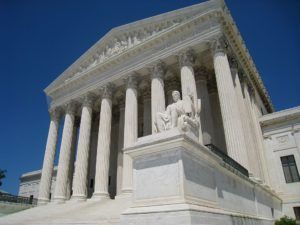
Prof. Andrew Koppelman of Northwestern University Law school has long supported gay marriage—I debated him back in 2004 in a University of St. Thomas Law School symposium.
He even believes the Constitution contains a right to same-sex marriage. But even he could not stomach Justice Kennedy’s “reasoning” in Obergefell:
The Supreme Court’s ruling Friday that the Constitution protects same-sex marriage was great news. The party pooper was the remarkably weak reasoning by which the Court got there. Reading the four dissents poke holes in Justice Anthony Kennedy’s opinion for the Court, I kept thinking, ‘Yeah, that’s fair,’ even though on the bottom line the Court clearly got it right. All of Kennedy’s worst traits — the ponderous self-importance, the leaps of logic, the worship of state power — were on display. For a decision this important, the Court should have been able to do better.
The problem, as Koppelman points out, is that Kennedy offers no theory as to why he has the right to decide the future of marriage in the first place:
All laws restrict liberty. How does a court decide which ‘specific rights’ are thereby protected? What are the boundaries of the “lawful realm”? Courts, Kennedy responds, must “exercise reasoned judgment in identifying interests of the person so fundamental that the State must accord them its respect.” He goes on to explain at length why marriage is so important:
Substantive due process invites courts to invent new law out of nothing — to declare as constitutionally protected any conduct that they think is important.
[…]
Justice Samuel Alito notes that Kennedy assumes that “the fundamental purpose of marriage is to promote the well-being of those who choose to marry.” This understanding of marriage is not universal. Many Americans have a different view, one closely tied to the capacity to procreate. The Court has no authority to simply privilege one view as the correct one. Again, that has nothing to do with law.
The fundamental problem is Kennedy’s opinion does not explain what business the Court has addressing the marriage question in the first place. The Court can step in because the protection of “liberty” means the Court can do anything it likes. If this is all the explanation they are going to get, then conservatives are right to feel bullied by judicial oligarchs.
Koppelman would have preferred the Court rule that marriage is gender discrimination. But, of course, his proposed solution, while it would not have required carving out a new unbounded dignitarian basis for expanding Kennedy’s power, would not have delivered what gay marriage advocates were really seeking: a ringing declaration of the equal moral worth of gay relationships in the eyes of the law. Kennedy gave that to them in spades; the Constitution is a paltry thing in his eyes to toss aside in order to establish this new public morality.
Maggie Gallagher is a senior fellow at American Principles in Action.


